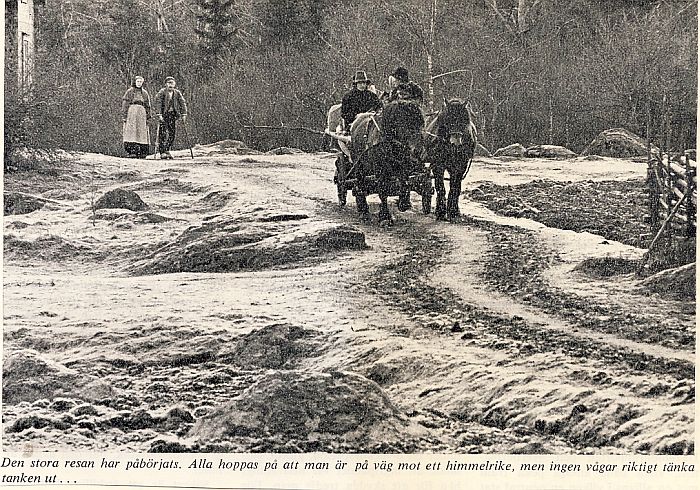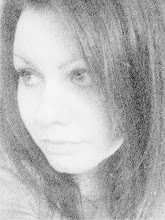 "The big journey has begun. Everyone's hoping that they're on the way towards a heaven, but it's still too frightning to follow the thought to its end..."
"The big journey has begun. Everyone's hoping that they're on the way towards a heaven, but it's still too frightning to follow the thought to its end..."For this I have to pick a perspective, which will prove to bigger task than it should be, so I'll start in the end where I came to think about it today, the books by Vilhelm Moberg. Emigrants, Settlers and Onto a good land, following a Swedish family, and some of their friends on their way from Sweden to their new home in the US, as part of the huge emigration wave in the 1800s. The family is in no way typical for the actual Swedes that left, yet the books have become somewhat of a representation of how it actually was. What Moberg was really trying to do was to capture the thought process which led to such a decision. But, it doesn't really matter what he was trying to do, as the book series took on a life of it's own a long time ago.
This is entertainingly similar to what the US has done to the old world. European history frozen in time to fit into the celebration of heritage. Coming across Americans and introducing myself as a Swede I often get the happy response of "I'm Swedish too!". Rarely is that the case however. As it turns out it's usually the greatgreatgrandfather. I'm sorry, but that doesn't make you a Swede. No offense, but it makes you an American with rather diluted Swedish heritage.
It confuses me a bit. Aren't Americans supposed to be proud over their country? Or is it the idea that their proud over, the fact that it had to be an active choice to move (yes, I know this is coming off as a bit racist as I'm talking about Americans as all being of European heritage. Go back and read what I said about having to chose perspective, again. Thank you for your cooperation.) Clinging to this history, celebrating the land of the forfathers. Lovely. But that has nothing to do with how Europe in general and Sweden in particular is, today. Look at this for instance http://www.lindstrom.mn.org/ It gives an unnerving feeling on being on the border of fact and fiction. Lindstrom is set where Moberg's emigrants went. They have a statue of Karl-Oskar and Kristina, and their bakery sells the original Swedish doughnut. Whatever that is, I couldn't tell you. But it is in fact typical, incoroprating something of the new land with something of the old. The Sweden that Lindstrom is trying to represent simply doesn't exist anymore. It's the Sweden of the late 1800s. The langugage has changed, the food has changed, the build up of society has changed.
And this is where I mean that (yes, I know only some) American get their "We're the most modern country in the world" attitude. As soon as we reduce the rest of the world to something it has been, rather than taking the time and effort and looking at what it has become and where it's heading as it asks of you to lift your eyes beyond your own back yard. In Sweden we have Hembygdsmuseum, emigrantmuseum, and so on and so forth, representing the times that fled, while Lindstrom has this as a sole representation of what has now become a modern nation.
The idea of relatives leaving their countries far, far away to come to a better place in Amerrikat isn't applicable anymore. It might have been for a short period of time. I'm not placing any values on which country is the best, but I surely prefer my own.
An anecdote; there's an emigration museum in Växjö corresponding to the immigration museum on the Swedish street in Chicago. I've been to both. I also visited the store, next to the museum, and never before had I been that happy to see Ballerina cookies and Kalles kaviar.
That is more true as to what Sweden is today, instead of pickled herring, aprons, clogs, milking cows and going to church. We go visit other countries, but we're generally quite happy to come back home. The vast majority of Swedes live in towns and cities, not on small barren farms. Now. Not then. I feel honored that the people of Lindstrom are so proud over their heritage, and I'm glad that I don't live in Sweden of 1871, but 2010. The US has changed too, it'd be naive to think that The Old World has remained the same.



0 comments:
Post a Comment